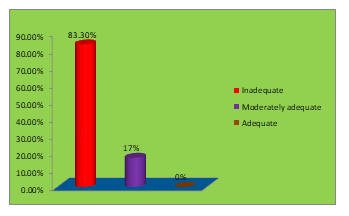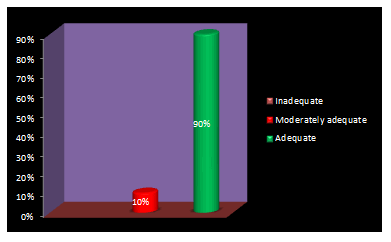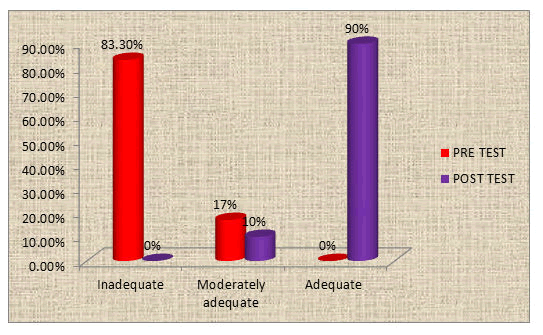Short Communication - Current Pediatric Research (2022) Volume 26, Issue 5
A study to assess the effectiveness of structured teaching programme on knowledge regarding dengue fever among the adolescent children (15-17years) in Hilton matriculation higher secondary school Chrompet chennai-44.
K Punitha*
Department of Health Nursing, Bharath University, Chennai, India
- Corresponding Author:
- Dr. K Punitha
Department of Health Nursing
Bharath University
Chennai
India
E-mail: emmanuelc20112006@gmail.com
Received: 09-Dec-2021, Manuscript No. AAJCP-22-49336;
Editor assigned: 13-Dec-2021, PreQC No. AAJCP-22-49336 (PQ);
Reviewed: 27-Dec-2021, QC No. AAJCP-22-49336;
Revised: 10-Feb-2022, Manuscript No. AAJCP-22-49336 (R);
Published: 17-Feb-2022, DOI: 10.35841/0971-9032.26.5.1399-1402.
Citation:K punitha. A study to assess the effectiveness of structured teaching programme on knowledge regarding dengue fever among the adolescent children (15-17 years) in Hilton matriculation higher secondary school Chrompet chennai-44. Curr Pediatr Res 2022;26(5): 1399-1402.
Abstract
Objective: Dengue fever is a mosquito-borne tropical disease caused by the dengue virus. Symptoms typically begin three to fourteen days after infection. Dengue is spread by several species of female mosquitoes of the Aedes type; principally an aegypti Treatment of acute dengue is supportive and includes giving fluid either by mouth or intravenously for mild or moderate disease. To assess knowledge level of adolescent children (15-17 years) regarding dengue fever, to assess knowledge level of adolescent children (15-17 years) regarding dengue fever, to assess the effectiveness of structured teaching programme regarding dengue fever among the adolescent children (15-17 years). Methods: The population for the study includes the Adolescent Children (15-17 Years) in Hilton matriculation higher secondary school, Chrompet, and Chennai-44. The sample used for the study was 60 (sixty) adolescent Children (18-20 Years). In this study adolescent Children were selected by simple random technique by lottery method. Results: paired ‘t’ test value is 10.6. It is hypothesized that there is significant (p<0.001) in effectiveness of structured teaching programme among adolescent children (15-17 years). There will be significant difference between pre-test and post-test level of knowledge regarding dengue fever among the adolescent children (15-17 years)
Keywords
Disease, Infection, Immune deficiency, Dengue virus, Symptoms, Intravenous.
Introduction
Dengue fever is a mosquito-borne tropical disease caused by the dengue virus. Symptoms typically begin three to fourteen days after infection. This may include a high fever, headache, vomiting, muscle and joint pains, and a characteristic skin rash. Dengue is spread by several species of female mosquitoes of the Aedes type, principally an aegypti. The virus has five types; infection with one type usually gives lifelong immunity to that type, but only short-term immunity to the others. Subsequent infection with a different type increases the risk of severe complications. A number of tests are available to confirm the diagnosis including detecting antibodies to the virus or it’s RNA [1,2].
Objectives
- To assess knowledge level of adolescent children (15-17 years) regarding dengue fever mothers of under five children regarding asthma before structured teaching programme.
- To assess knowledge level of adolescent children (15-17 years) regarding dengue fever mothers of under five children regarding asthma after structured teaching programme.
- To assess the effectiveness of structured teaching programme regarding dengue fever among the adolescent children (15-17 years)
- H1 There will be significant difference between pre-test and post-test level of knowledge regarding dengue fever among the adolescent children (15-17 years) [3].
Table 1. The pre-test knowledge level of adolescent children (15-17 years) regarding dengue fever.
| Pre-test knowledge | Number | % |
|---|---|---|
| Inadequate (50 and below) | 50 | 83.3 |
| Moderately adequate (51-75%) | 10 | 17 |
| Adequate (76-100%) | NIL | NIL |
The Table 1 and Figure 1 reveals the pre-test knowledge level of adolescent children regarding dengue fever among the adolescent children (15-17 years). 50 (83.3%) had inadequate knowledge and majority of them 10 (17%) had moderately adequate knowledge, none of them had adequate knowledge [4].
Table 2. The post-test knowledge level of adolescent children (15-17 years) regarding dengue fever.
| Post-test knowledge | No | % |
|---|---|---|
| Inadequate(50 and below) | 0 | 0 |
| Moderately adequate (51-75%) | 6 | 10 |
| Adequate (76-100%) | 54 | 90 |
The Table 2 reveals Post-test knowledge level of adolescent children (15-17 years) regarding dengue fever in (Figure 2). None of them had inadequate knowledge, 6 (10%) had moderately adequate knowledge, and majority of them 54 (90%) had adequate knowledge [5].
Table 3. The effectiveness of structured teaching programme regarding management dengue among adolescent children (15-17 years).
| Variables | Pre test knowledge | Post test knowledge | Effectiveness | (Paired) ‘t’value | |||
|---|---|---|---|---|---|---|---|
| Knowledge | MEAN | SD | MEAN | SD | MEAN | SD | 10.6 |
| 14.6 | 3.5 | 19.5 | 3.2 | 5.9 | 4 | ||
The Table 3 and Figure 3 reveals the effectiveness of structured teaching programme regarding dengue fever among adolescent children (15-17 years). 50(83.3%) had inadequate knowledge and majority of them 10(17%) had moderately adequate knowledge, none of them had adequate knowledge in pre-test. In post none of them had inadequate knowledge, 6 (10%) had moderately adequate knowledge and majority of them 54(90%) had adequate knowledge regarding dengue fever [6,7,8] (Table 4).
Table 4. The mean and standard deviation of pre and post test knowledge
| S. no | Knowledge | Pre test | Post test | ||||||||||
|---|---|---|---|---|---|---|---|---|---|---|---|---|---|
| Inadequate | Moderately adequate | Adequate | Inadequate | Moderately adequate | Adequate | ||||||||
| (50 and below) | (51-75%) | (76-100%) | (50 and below) | (51-75%) | (76-100%) | ||||||||
| N | % | N | % | N | % | N | % | N | % | N | % | ||
| 1 | Over all knowledge on management and prevention of HIV infection among adolescent children (18-20 years) | 50 | 83.3 | 10 | 17 | 0 | 0 | 0 | 0 | 6 | 10 | 54 | 90 |
Conclusion
The study was conducted to assess the effectiveness of structured teaching programme regarding dengue fever among adolescent children (15-17 years) the discussion was based on the objectives, and hypothesis. With regard to pre-test and post-test level of adolescent children (15-17 years). The pre knowledge level of adolescent children regarding dengue fever among the adolescent children (15-17 years). 50 (83.3%) had inadequate knowledge and majority of them 10 (17%) had moderately adequate knowledge, none of them had adequate knowledge. In post-adolescent children (15-17 years) regarding dengue fever none of them had inadequate knowledge, 6 (10%) had moderately adequate knowledge, and majority of them 54 (90%) had adequate knowledge. The overall paired ‘t’ test value is 10.6. It is hypothesized that there is significant (p< 0.001) in effectiveness of structured teaching programme among adolescent children (15-17 years). There will be significant difference between pre-test and post-test level of knowledge regarding dengue fever among adolescent children (15-17 years).
References
- Mishra S, Ramanathan R, Agarwalla SK. Clinical profile of dengue fever in children: A study from Southern Odisha. Indian J Sci Res. 2016; 24: 2016.
[Crossref] [Google Scholar] [Pubmed].
- Kularatne SA. Dengue fever. Bmj. 2015;15: 351-352.
[Crossref] [Google Scholar] [Pubmed].
- Abbott MB, Vlasses CH. Nelson textbook of pediatrics. Jama. 2011;306 (21): 2387-2388.
[Crossref]
- Biswas BK. Effect of climatel change on vector-borne disease. 2022;1:263-316.
[Crossref]
- Bhatt S, Gething PW, Brady OJ, et al. The global distribution and burden of dengue. Nature. 2013;496(7446):504-507.
[Crossref] [Google Scholar] [Pubmed].
- Guzman MG, Harris E. Dengue. The Lancet. 2015;385(9966):453-65.
- Sabchareon A, Wallace D, Sirivichayakul C, et al. Protective efficacy of the recombinant, live-attenuated, CYD tetravalent dengue vaccine in Thai schoolchildren: a randomised controlled phase 2b trial. The Lancet. 2012;380(9853):1559-1567.
[Crossref][Google Scholar][Pubmed].
- Capering MR, Tran NH, Hadinegoro SR, et al. Clinical efficacy and safety of a novel tetravalent dengue vaccine in healthy children in Asia: a phase 3, randomised, observer-masked, placebo-controlled trial. The Lancet. 2014;384(9951):1358-65.
[Crossref][Google Scholar][Pubmed].


